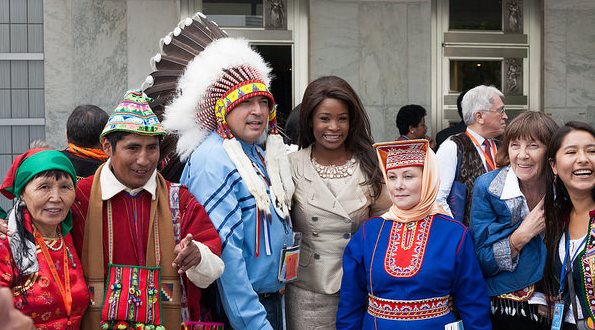BECOME A MEMBER
>JOIN
UN Hosts First World Conference on Indigenous Peoples

September 26, 2014
From September 22-23, the United Nations hosted its first-ever World Conference on Indigenous Peoples at the UN Headquarters in New York, as reported by the UN News Center.
As the first-ever World Conference on Indigenous Peoples opened in New York, indigenous delegates, Heads of State and Government, UN officials and representatives of national human rights institutions sat down to share perspectives and best practices in order to address inequalities that adversely affect indigenous communities
Comprising more than five per cent of the global population, the world’s 370 million indigenous peoples identify themselves as distinct peoples with their own social, economic, and political systems, and unique languages, cultures and beliefs.
Indigenous peoples are effective advocates for their rights, and have engaged the UN since its inception. In 2007, the UN General Assembly adopted the landmark Declaration on the Rights of Indigenous Peoples, which sets minimum standards for their survival, dignity and well-being. Countries are beginning to reflect these principles in their laws, but there is a long road ahead.
To forge new ways to advance the rights of the indigenous, including the objectives of the UN Declaration, more than a thousand participants from every corner of the globe gathered at UN Headquarters in New York for the first-ever World Conference on Indigenous Peoples – convened in September 2014 as a high-level meeting of the General Assembly.
The Conference adopted an action-oriented Outcome Document, negotiated in advance by indigenous groups and Member States, which, when implemented, “will bring about “sweeping changes for current and future generations of indigenous peoples,” said General Assembly President Sam Kutesa.
“Unless we mainstream the rights of indigenous peoples, unless we are serious about their empowerment, unless we work with them as equal partners – then any global development agenda we conceive will be a hollow exercise, empty, because it will not reach the most disadvantaged,” said IFAD President Kanayo Nwanze at the Conference.
“The World Conference should serve as a turning point for translating the UN Declaration into concrete action,” Assembly President Kutesa said. “This will require Member States to make greater efforts to translate [the] Outcome Document into reality and demonstrate resolve in addressing inequalities that adversely affect indigenous communities,” he added.
[...]
Read the full article at the UN News Centre.
Photo courtesy of United Nations Photo.

